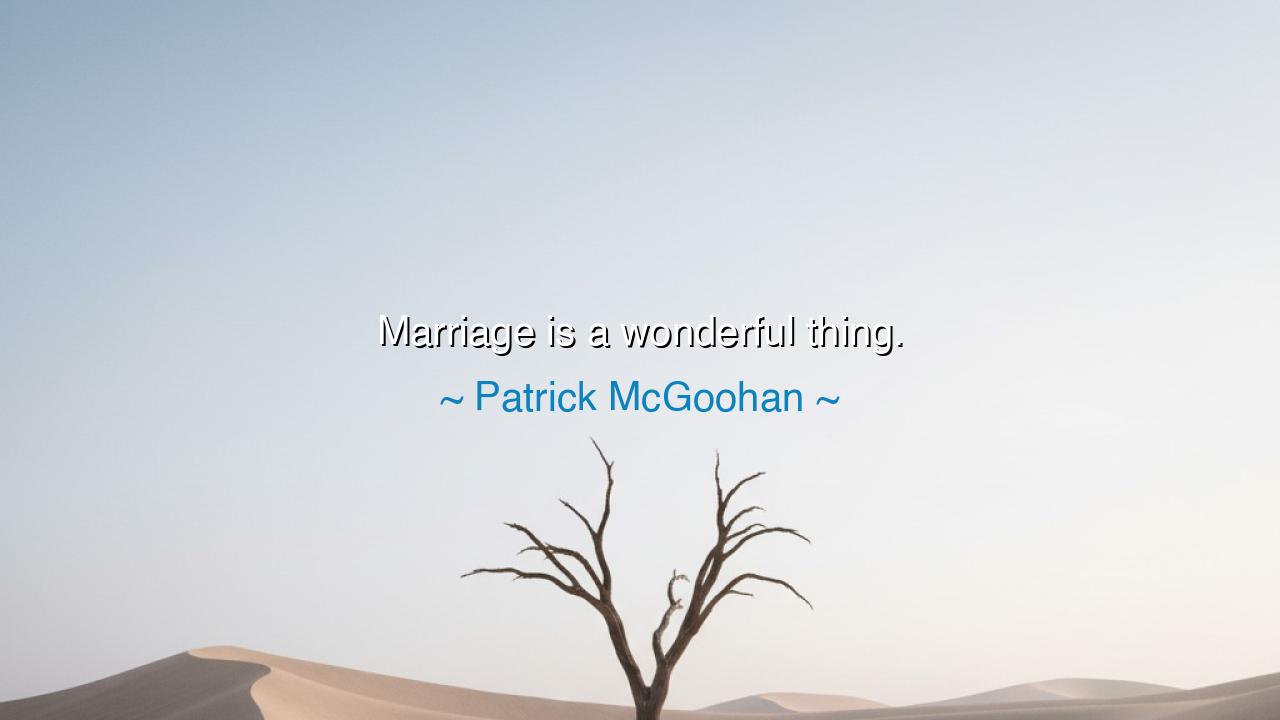
Marriage is a wonderful thing.






Come close, O children of wisdom, and listen well to the words of Patrick McGoohan, a man who, with simple yet profound clarity, declared: "Marriage is a wonderful thing." These words, though brief, hold a weight that transcends the moment in which they were spoken. For marriage, that sacred union between two souls, has long been regarded as both a cornerstone of society and a source of deep personal fulfillment. But what, then, does McGoohan truly mean when he calls marriage a "wonderful thing"? Is it the joining of hearts alone that makes it so? Or does this statement call us to recognize something deeper, something more enduring in the nature of this bond?
Marriage, in the deepest sense, is not merely the coming together of two people—it is the merging of two lives, two journeys, and two individual spirits. It is an act of partnership, of mutual respect, where each person offers their strength and vulnerability, their dreams and disappointments, to another. Through this union, marriage becomes a source of growth, where both individuals are shaped by the bond they share, each helping the other to rise to greater heights. McGoohan’s words call us to see this union not as a burden, not as a mere social contract, but as a wonderful force that enriches the lives of those who embark upon it.
Consider the ancient story of Penelope and Odysseus, whose marriage was a symbol of both love and loyalty. Penelope, the wife of the great Greek hero Odysseus, waited for him to return from his long journey, fending off suitors who sought to claim her in his absence. Her devotion was not a passive waiting but an active commitment to the love they shared, a testament to the strength of their bond. In her, we see that marriage is not just about companionship in the moment, but the commitment to see each other through the trials of life, however long and difficult the journey may be. For Penelope, marriage was a wonderful thing, for it gave her purpose, hope, and a deep sense of connection that endured the tests of time and distance.
Similarly, in the life of Abigail Adams, wife of the second president of the United States, John Adams, we see how marriage can be a foundation for both personal and collective growth. Abigail was not only a partner to John in the most personal sense, but also a trusted confidante and adviser as he worked through the monumental challenges of establishing a new nation. Their marriage was a union of intellect, will, and affection, where each person not only supported the other but also challenged each other to be their best. In Abigail Adams, we see how marriage can be a wellspring of strength, where love and partnership become forces for change and progress.
Yet, O children, McGoohan’s statement also holds a deeper, more introspective truth. Marriage is not only wonderful for the joy and growth it brings, but also for the profound lessons it offers. In a marriage, one often confronts the deepest parts of oneself—the places where selfishness, fear, and pride lurk. Through the reflections of another, we come to see both our strengths and our weaknesses, and it is through this recognition that we can grow. McGoohan reminds us that marriage is a mirror, not just a sanctuary, reflecting back both the beauty and the imperfections of those involved. And it is through accepting these imperfections, and working together to overcome them, that marriage becomes a wonderful journey of continuous self-discovery.
In the ancient world, we also find the story of Antigone, the daughter of Oedipus, whose dedication to family and duty transcended the personal sacrifices of marriage. Although Antigone never married, her story reflects the sacrifice and loyalty often found within the bonds of marriage—the willingness to give oneself wholly to another cause, even at great personal cost. Antigone’s unwavering commitment to family and justice speaks to the strength that comes from love and duty, qualities that are often at the heart of a marriage. Her story reminds us that marriage is not only about joy and companionship, but also about the sacrifices made for the ones we love, and the lasting commitment to those bonds.
The lesson, O children, is clear: marriage is indeed a wonderful thing, but not because it is without challenges or sacrifices. It is wonderful because it holds the potential for deep growth, for self-discovery, and for unwavering commitment. It teaches us the value of partnership, of mutual respect, and of working together toward common goals. Through marriage, we come to understand that love is not just about passion or fleeting moments of joy, but about the steady, often quiet, work of building a life together—one that is full of meaning and shared purpose.
Therefore, O children, as you walk your own path, understand that marriage is a journey of discovery. Embrace it not as a destination, but as a path where you and your partner walk side by side, learning from each other, supporting each other, and building something greater than yourselves. Let it be a source of strength and growth, where love is not just a feeling, but a commitment to create a life that is worthy of the ideals you hold dear. In this, you will find the true wonder of marriage—a force that can transform, elevate, and inspire you, as it has inspired generations before you.






AAdministratorAdministrator
Welcome, honored guests. Please leave a comment, we will respond soon